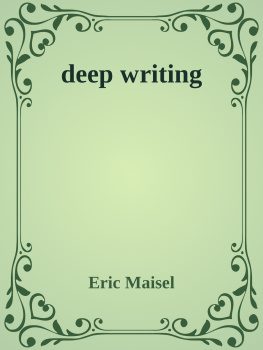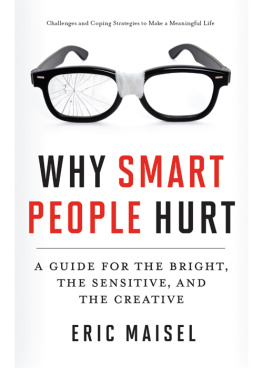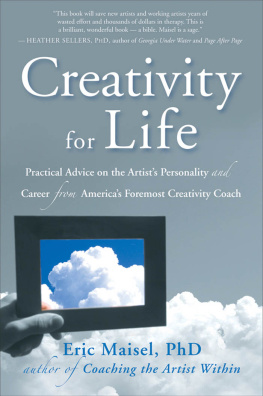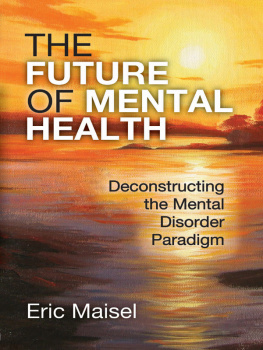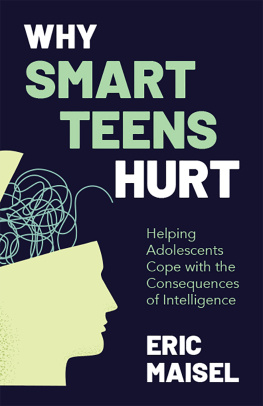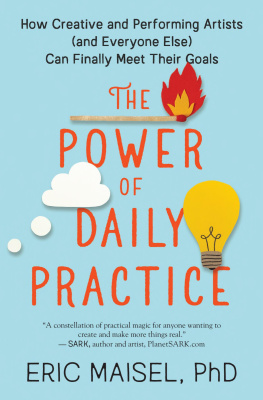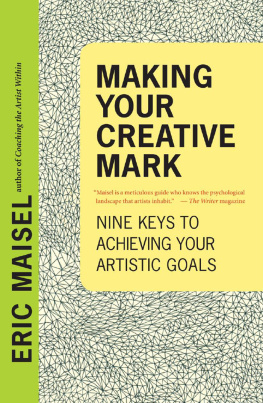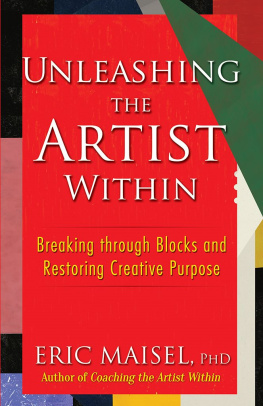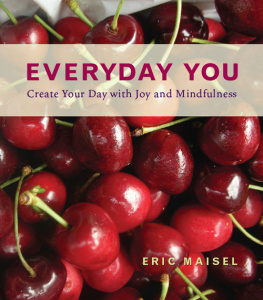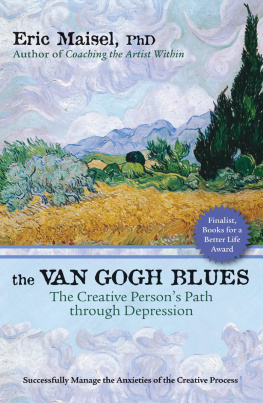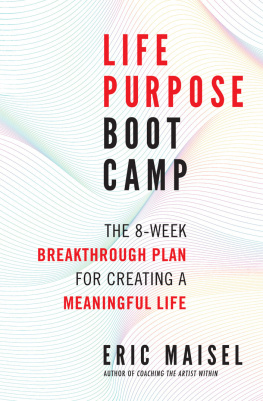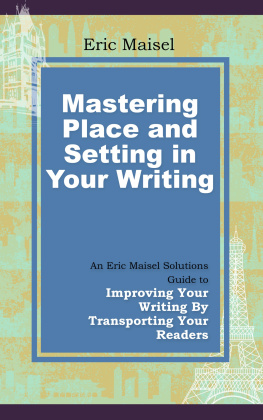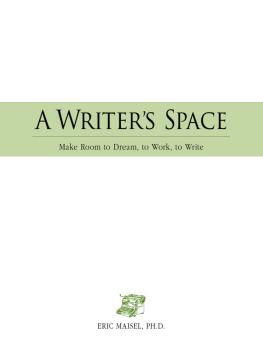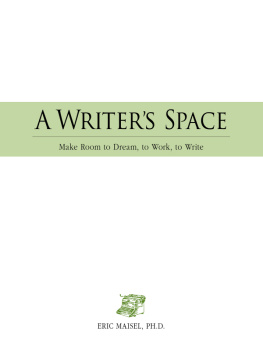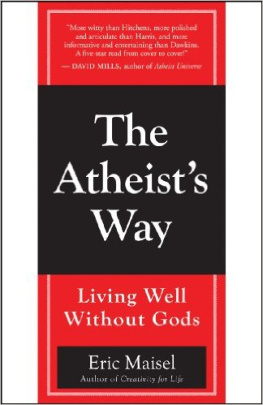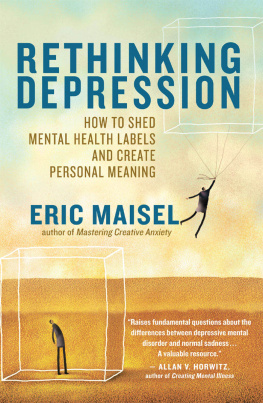Eric Maisel - Deep writing
Here you can read online Eric Maisel - Deep writing full text of the book (entire story) in english for free. Download pdf and epub, get meaning, cover and reviews about this ebook. year: 2014, publisher: Jeremy P. Tarcher/Putnam, Penguin Putnam Inc., genre: Science fiction. Description of the work, (preface) as well as reviews are available. Best literature library LitArk.com created for fans of good reading and offers a wide selection of genres:
Romance novel
Science fiction
Adventure
Detective
Science
History
Home and family
Prose
Art
Politics
Computer
Non-fiction
Religion
Business
Children
Humor
Choose a favorite category and find really read worthwhile books. Enjoy immersion in the world of imagination, feel the emotions of the characters or learn something new for yourself, make an fascinating discovery.
- Book:Deep writing
- Author:
- Publisher:Jeremy P. Tarcher/Putnam, Penguin Putnam Inc.
- Genre:
- Year:2014
- Rating:5 / 5
- Favourites:Add to favourites
- Your mark:
- 100
- 1
- 2
- 3
- 4
- 5
Deep writing: summary, description and annotation
We offer to read an annotation, description, summary or preface (depends on what the author of the book "Deep writing" wrote himself). If you haven't found the necessary information about the book — write in the comments, we will try to find it.
Eric Maisel: author's other books
Who wrote Deep writing? Find out the surname, the name of the author of the book and a list of all author's works by series.
Deep writing — read online for free the complete book (whole text) full work
Below is the text of the book, divided by pages. System saving the place of the last page read, allows you to conveniently read the book "Deep writing" online for free, without having to search again every time where you left off. Put a bookmark, and you can go to the page where you finished reading at any time.
Font size:
Interval:
Bookmark:
DEEP WRITING:
7 PRINCIPLES THAT BRING IDEAS TO LIFE
Eric Maisel
Contents
Principle Page
Introduction
Published by: Jeremy P. Tarcher/Putnam, Penguin Putnam Inc., 375 Hudson Street, New York, NY 10014.Copyright 1999 by Eric MaiselBOOK JACKET INFORMATIONWRITING / CREATIVITYDeep Writing is more than `just another writing book.` It provides writers with the kind of life-saving help that only Eric Maisel knows how to offer.STEVE METTEE, PUBLISHER,THE PORTABLE WRITERS CONFERENCEFrom bestselling author to closet novelist, there isnt a writer alive who hasnt experienced the terrifying paralysis of writers block or the challenges of maintaining momentum and focus. As a therapist specializing in counseling artists, Eric Maisel knows how severely psychology, rather than lack of talent, can limit personal creativity. We can all write serviceably, but truly good writing deep writingcomes from accessing that place of powerful emotions where we are most vulnerable to feelings of fear and anxiety. With wise insight into the contemporary publishing market. Deep Writing reveals the seven principles that break through mental roadblocks and slay psychological demons, freeing you to write with passion, purpose, and meaning.Author of A Life in the Arts , Fearless Creating , and Affirmations for Artists , ERIC MAISEL, PH.D., works exclusively with artists in his private psychotherapy practice and in group writing workshops. A regular contributor to Writers Digest, he lives near San Francisco.Eric Maisel has made a career out of helping artists and writers cope with the traumas and troubles that are the price of admission to a creative life.INTUITION MAGAZINEwww.penguinputnam.comBy the Same AuthorFiction The Black NarcThe Kingston Papers Dismay The Blackbirds of Mulhouse The Fretful DancerNonfiction Staying Sane in the Arts Artists Speak A Life in the Arts Fearless Creating Affirmations for Artists Fearless Presenting
Acknowledgments
First, I would like to thank all the folks at Tarcher/Putnam, a few of whom I know and most of whom I dont, who have contributed to the making of this book. My thanks especially to Jeremy Tarcher, for his continuing support and good conversation in airport restaurants, and to Wendy Hubbert, this books editor, who has had the painful task of telling me more times than either of us can count that this or that still needed fixing.
Next, I would like to thank the writers I have seen in my creativity consulting and psychotherapy practices, and those I have visited with at workshops and writers conferences, for their contributions to my understanding of the challenges and joys of writing. I would also like to thank the many people who have written to me, often at length, about their experiences in the arts and their thoughts and feelings about the creative life. One of those letters has an important place in this book; all of them are important to me. Thank you all.
Last, I would like to thank my family, whose love and support are valuable beyond reckoning.
For Ann, with love and gratitude
DEEP WRITING: Introduction
Ive been counseling writers for the past fifteen years, first as a psychotherapist and now as a creativity consultant. For the past ten years Ive also taught writing at the college level, to adults returning to school after a significant absence. And Ive been writing for nearly thirty yearsnovels and self-help nonfiction, articles and short stories, for big publishing houses and miniature houses, for professional houses and commercial houses, as a ghostwriter and under my own name. From these three adventuresas writer, writing teacher, and writers counselorIve learned a lot.
I put many of my thoughts about creativity and the creative life in my previous books, like Fearless Creating , A Life in the Arts , and Affirmations for Artists . But although much of what I had to say in those books was of use to writers, I never set out to write a book exclusively for them, my creative brethren. Now seems like exactly the right moment. As I cross fifty, with more than twenty books under my belt, many of them published and many of them unpublished, it is a great pleasure, bordering on a thrill, to stop and chat with my fellow writers about our special calling.
What do I want to accomplish in this book? First, Id like to help you write, if you happen to want to write. Second, Id like to help you write deeply, if youre going to write at all. By writing deeply I mean: writing passionately and well about those things that really matter to you. I think that I have a good idea how people can get from not-writing to writing and from writing to writing deeply, and this is what I will share with you in the following pages. The process of becoming a deep writer involves the following seven principles:
- Hushing the Mind
- Holding the Intention
- Making Choices
- Honoring the Process
- Befriending the Work
- Evaluating the Work
- Doing Whats Required
As I explain these seven principles to you, Ill offer some advice about how to put them into practice, and provide some exercises to help you get started. In addition, because every writer is unique, Ive invented case studies of five writers from differing backgrounds to help us explore how these principles apply to people with various needs and life experiences. Let me introduce our five fictional writers.
- Amelia.
- Marjorie.
- Sam.
- Anne.
Now in her late twenties, Amelia writes short stories, poetry, and social commentary. She lives her life at the chaotic end of the spectrum, and her relationships tend toward the intense, the volatile, and the dramatic. She drinks enough that she is beginning to call it a problem; she experiences occasional but severe bouts of depression; and her day job is virtually unbearable. She is a stylish, fluent writer but feels uncertain about what to write next. She would like to tackle something large and grand, but she cant put her finger on what that might be.
In her late forties, Marjorie is married and has college-age children. She was an English major in college; shes always wanted to write but never has. She is thinking about writing a novela dream and a goal she has painfully kept alive for almost thirty years. She is soft-spoken, self-critical, and critical of others, although she doesnt like to be thought of as judgmental. She has the idea that she might like to write a historical novel or maybe an adventure yarn for young adults. But she doesnt feel close to choosing a topic or beginning to write.
Sam doesnt think of himself as a writer. But for career reasons hes embarked on a doctoral program in business that requires him to produce a dissertation. Sam is in his mid-thirties, works in the computer industry, and thinks of himself primarily as a problem-solver. He doubts that his grammar and spelling are all that good, but he has faith in his computers spell checking and grammar checking programs. What really worries him is getting an idea important enough to pursue and solid enough to pass the muster of his dissertation committee. Every day he falls further behind on the preparation of his dissertation proposal. When asked how the proposal is going, he replies, Its not! Im a 5 terrible procrastinator!
Anne has always written. Early in life, she thought shed become an archaeologist or a filmmaker, but without making any conscious choice she discovered that shed written her first novel by the time she was twenty-two. It never got published, and neither did her second, but her third did. It sold modestly well, and subsequently Anne managed to sell three other novels. But she has had to scramble to make ends meet, working day jobs and teaching creative writing at a local college. At thirty-eight, she retains few romantic illusions about the writers life, but she still feels passionate about writing. She wonders if now is the time to attempt a formula novel or some kind of bestseller fiction that will catapult her out of the midlist.
Font size:
Interval:
Bookmark:
Similar books «Deep writing»
Look at similar books to Deep writing. We have selected literature similar in name and meaning in the hope of providing readers with more options to find new, interesting, not yet read works.
Discussion, reviews of the book Deep writing and just readers' own opinions. Leave your comments, write what you think about the work, its meaning or the main characters. Specify what exactly you liked and what you didn't like, and why you think so.

